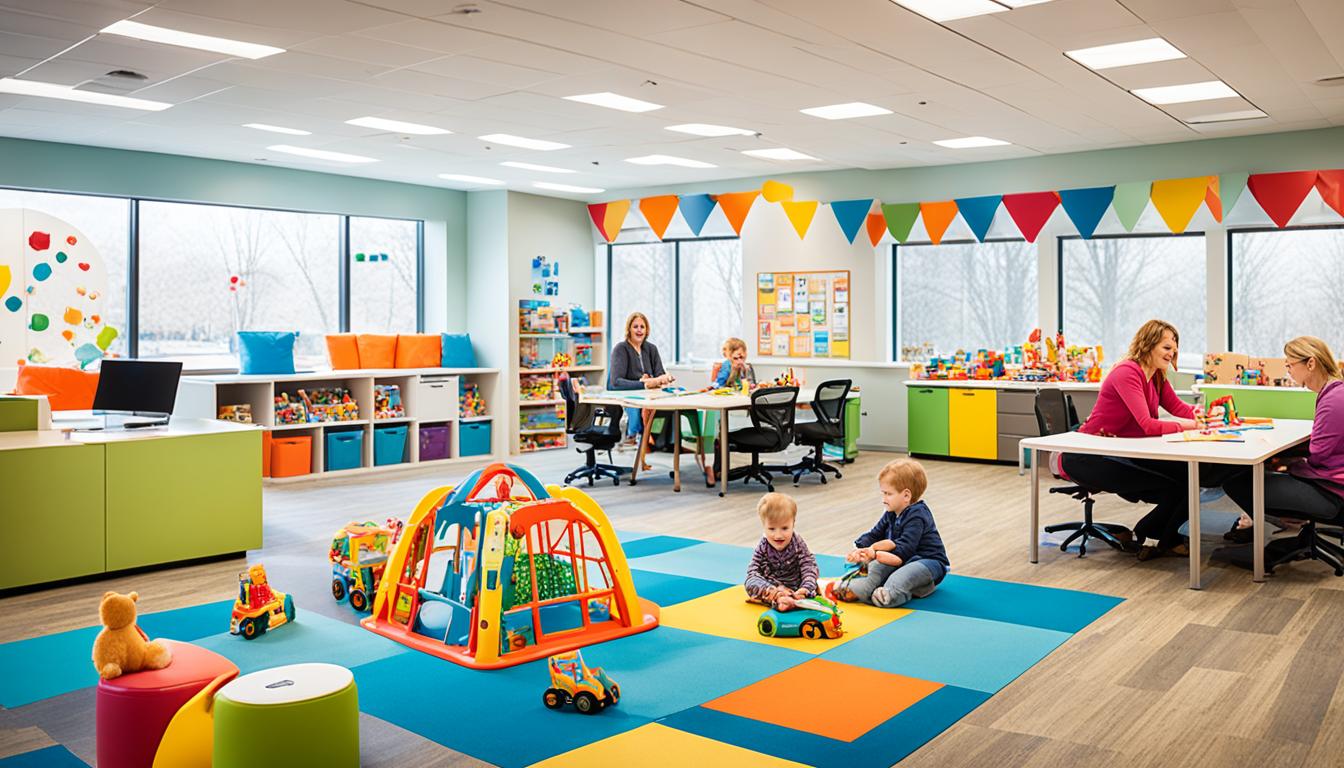
Workplace Wonders: Finding Family-Friendly Workplaces in 2024
Finding a family-friendly workplace is a top priority for many parents in 2024. In order to achieve a better work-life balance, parents are seeking out workplaces that offer inclusive benefits and support for their families. This article will explore the keys to finding family-friendly workplaces in 2024, focusing on the importance of work-life balance and the benefits that can make a workplace truly family-friendly.
Key Takeaways:
- The demand for family-friendly workplaces is increasing in 2024
- Work-life balance is crucial for parents
- Inclusive benefits for parents contribute to a family-friendly work environment
- Creating a family-friendly culture relies on supportive management and work-life integration programs
- Finding a family-friendly workplace enhances employee loyalty and satisfaction
The Importance of Work-Life Balance
Work-life balance plays a crucial role in the lives of parents striving to achieve harmony between their work and family responsibilities. In today’s fast-paced world, companies that prioritize work-life balance are highly sought after by parents who value their well-being. These forward-thinking organizations understand the importance of flexibility in scheduling and provide options for remote work.
Employers who offer flexible work hours and remote work options empower parents to effectively manage their family obligations while still being productive professionals. By embracing flexible scheduling, working parents can attend school events, prioritize childcare needs, and have more control over their daily routines.
A Shift Towards Flexible Scheduling and Remote Work Options
The demand for flexible scheduling and remote work options has grown significantly in recent years. With advancements in digital technology and the increasing prevalence of remote work practices, more companies are recognizing the benefits of accommodating their employees’ needs.
“Flexible work hours and remote work options have become essential for parents. They allow me to maintain a healthy work-life balance while being present for my children’s important milestones.” – Emily, Marketing Manager
Offering these flexible arrangements not only demonstrates an understanding of the unique challenges faced by working parents but also helps attract and retain top talent. By giving employees the opportunity to work from home or adjust their schedules, employers foster loyalty, job satisfaction, and a positive work environment.
Benefits of Work-Life Balance for Employers and Employees
Work-life balance initiatives not only benefit employees but also contribute to the overall success of organizations. When employees have the freedom to balance their personal and professional lives, they experience reduced stress levels, increased job satisfaction, and improved productivity. This ultimately leads to higher employee retention rates and attracts highly skilled individuals who appreciate a family-friendly workplace.
Furthermore, a study conducted by the Harvard Business School found that employees who have a good work-life balance exhibit higher levels of commitment to the organization, resulting in enhanced job performance and greater organizational commitment.
Embracing Work-Life Balance for a Brighter Future
As we navigate the ever-evolving landscape of work, promoting work-life balance should remain a priority for employers seeking to create family-friendly workplaces. By offering flexible scheduling and remote work options, companies can position themselves as advocates for their employees’ well-being and demonstrate their commitment to fostering a healthy work-life integration.
As we move forward, it is crucial for employers to understand that work-life balance is not just a perk but a fundamental aspect of a supportive work environment. Investing in work-life balance programs and initiatives will not only benefit employees but also contribute to the long-term success and sustainability of organizations.
At a Glance: Importance of Work-Life Balance
| Benefits for Employees | Benefits for Employers |
|---|---|
| Reduced stress levels | Higher employee retention rates |
| Increased job satisfaction | Enhanced productivity |
| Improved work-life integration | Greater organizational commitment |

Inclusive Benefits for Parents
Inclusive benefits for parents play a pivotal role in defining a truly family-friendly workplace. Companies that prioritize the well-being of their employees’ families understand the importance of providing comprehensive support. From parental leave policies to childcare assistance and family wellness programs, these benefits showcase a commitment to creating a nurturing and supportive work environment.
Generous Parental Leave Policies
Family-friendly workplaces recognize the significance of allowing new parents to bond with their newborns without compromising their careers. Through generous parental leave policies, employers demonstrate their understanding of the importance of this special time and the need for parents to be physically and emotionally present for their children. By providing sufficient time off and job security, companies enable parents to navigate the challenges of early parenthood while maintaining a fulfilling professional life.
Childcare Assistance
Childcare is a significant concern for working parents, both logistically and financially. Family-friendly workplaces address this need by offering childcare assistance programs. This may include on-site daycare facilities or subsidies for external childcare services. By providing these resources, employers alleviate the stress and financial burden associated with finding reliable and affordable childcare options. Working parents can be reassured that their children are in safe hands while they focus on their professional responsibilities.
Family Wellness Programs
A holistic approach to family well-being is a hallmark of family-friendly workplaces. Family wellness programs support employees and their families by prioritizing their physical and mental health. These programs often encompass activities such as fitness classes, mental health resources, and educational workshops tailored to the needs of families. By investing in the well-being of their employees and their families, employers foster an environment that promotes work-life balance and overall family wellness.
To summarize, inclusive benefits for parents, which include generous parental leave policies, childcare assistance, and family wellness programs, are key indicators of a family-friendly workplace. Employers that prioritize these benefits demonstrate their commitment to supporting the needs of working parents and creating an inclusive and nurturing work environment.

Creating a Family-Friendly Culture
Building a family-friendly culture within a workplace extends beyond providing benefits; it necessitates a supportive management team and initiatives that promote work-life integration. Supportive managers possess a deep understanding of the challenges faced by parents and exhibit flexibility and empathy when it comes to family obligations. Recognizing the importance of work-life balance, employee resource groups focused on supporting working parents offer a sense of community and foster camaraderie among like-minded individuals.
To reinforce the significance of work-life balance and cultivate a positive and inclusive work environment, work-life integration programs, such as wellness initiatives and family-friendly events, play a crucial role. These programs highlight the value placed on the well-being of employees and their families, demonstrating the organization’s commitment to supporting work-life balance.
Such initiatives not only enhance the overall employee experience, but also contribute to attracting and retaining talented and dedicated professionals who prioritize a harmonious integration of work and family life.
FAQ
What are some key factors to consider when looking for a family-friendly workplace?
When searching for a family-friendly workplace, it is important to consider factors such as work-life balance, inclusive benefits for parents, and a supportive and inclusive culture.
How does work-life balance contribute to a family-friendly workplace?
Work-life balance is crucial for parents, as it allows them to integrate their work and family lives harmoniously. By offering flexibility in scheduling and remote work options, employers enable parents to attend to their family responsibilities while still being productive at work.
What are some inclusive benefits that make a workplace family-friendly?
Family-friendly workplaces provide generous parental leave policies, childcare assistance such as on-site daycare or subsidies, and family wellness programs that prioritize the well-being of employees and their families.
How can a workplace create a family-friendly culture?
Creating a family-friendly culture involves having supportive managers who understand the challenges parents face, employee resource groups that support working parents, and work-life integration programs that promote a positive and inclusive work environment for employees and their families.
Why is it important for employers to prioritize family-friendly workplaces?
Prioritizing family-friendly workplaces not only attracts top talent, including parents who value work-life balance, but also contributes to employee retention. By meeting the needs of their employees’ families, employers create a supportive and engaging work environment.